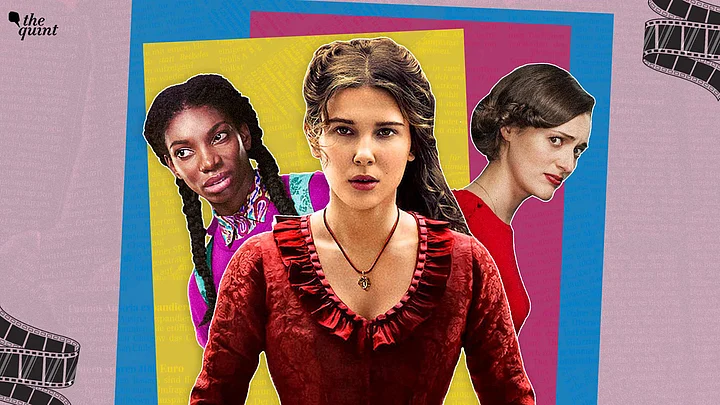(This article contains mild spoilers)
Phoebe Waller-Bridge’s Fleabag has given us, the audience, lots of things – ample doses of feminist humour, the invaluable lesson that ‘HAIR IS EVERYTHING’, and most importantly, the hot priest! But what it truly succeeded in doing was popularise a cinematic technique seldom attributed to women characters in films and TV shows – breaking the fourth wall.
What is the fourth wall? Let’s call it a conceptual wall between you and a character in a movie or a TV show. You can see them through it, but they can’t see you. But when they start acknowledging that you are, in fact, watching them, they’re breaking the fourth wall…like this:
Throughout the evolution of cinema, characters have broken the fourth wall in different ways: just by looking at the camera (the iconic scene in Bong Joon-ho’s Memories of Murder), by interacting with the audience and explaining plot points (Adam Mckay’s Big Short), or by fully dismantling the lines that separate real and reel lives, as done by Brit Marling in The OA.
But Who Gets To Break It?
Historically, men have used the fourth wall technique more often than women (do I dare say they love mansplaining?). You see, a character who’s breaking the fourth wall has definitely more power – in a way – than the other unsuspecting characters in a film or TV show. They get to escape their own world and unburden themselves to the audience.
Ferris Bueller (Matthew Broderick) has done it with his shower monologue, as have Alvie Singer (Woody Allen) in Annie Hall and Jordan Belfort (Leonardo DiCaprio) in The Wolf of Wall Street. And who can forget Marvel’s cheekiest anti-hero Deadpool’s (Ryan Reynolds) tryst with the audience?
Of late, however, the fourth wall is being excessively broken by women with the rise of women-centric comedies. Though British sitcoms Miranda (2009-15) and Michaela Coel’s Chewing Gum (2015) began using the fourth wall as a comedic device well before Fleabag (2016), more creators have begun employing the technique – in a Fleabag-esque way – owing to the show’s massive success.
Netflix’s Enola Holmes and Marvel’s She-Hulk: Attorney at Law are some of the notable examples in which women protagonists share their personal thoughts with the audience. In fact, Penelope, played by Kalki Koechlin, in Netflix’s anthology film Paava Kadhaigal also breaks the fourth wall the same way.
But why is the use of this technique on the rise, especially in women-led films and TV shows? This is the part where I’m supposed to say:
You’re Sort of Like Her Best Friend
What most of these shows essentially try to do by breaking the fourth wall is create a sense of intimacy with the audience. Take, for instance, the character Fleabag (Phoebe Waller-Bridge) – you don’t even know her real name but you know what she’s thinking throughout the show. Why? Because she tells you exactly what she’s thinking.
In fact, you even know things that other characters in the show don’t. It’s almost like you’re her friend and confidante.
A woman’s most personal thoughts in movies and TV shows were, up until now, revealed to the audience through her conversations with her BFFs, her diary entries, or even through music. Breaking the fourth wall can hook the audience to her story in a more lasting way – because, well, she’s telling the story directly to YOU. And aren’t you a good listener?
The technique has worked so well in some shows that the audience may even feel like they’re an active participant in her life. I mean, was it just me, or were all of you spooked when the hot priest found out that Fleabag was talking to us?!
Here’s Looking at You, Kid
For decades, women characters in cinema were defined by the male gaze – be it of the filmmaker, the male characters, or the audience. They were either reduced to the roles of mother and wife or seen as objects of desire – they had no control over their own narratives.
But when women began telling their own stories, it created a shift in the narrative – in terms of how the camera saw them, how their stories were told, and how the audience perceived them. That's textbook female gaze!
So, what happens when a woman character on screen returns the gaze of the audience by breaking the fourth wall? She knows you’re watching her and she shows you only what she wants you to see. That gives her quite a bit of power.
Let me give you an example, but watch out for SPOILERS!
In Marvel’s She-Hulk, Jen Walters (Tatiana Maslany) quite literally stops her own show because "none of this makes sense." She smashes the fourth wall and meets Marvel head Kevin Feige to discuss it! She appears to be a character who is so self-aware that rewrites her own show midway!
In other words, women characters breaking the fourth wall is an extension of the female gaze. And it's no surprise that the use of this technique coincides with the rise of feminist films and TV shows, created or written by women themselves.
(This article was first published on 8 November 2022. It has been republished from The Quint's archives in the run-up to International Women's Day on 8 March.)
